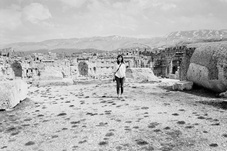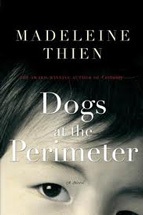 Madeleine Thien Madeleine ThienPhoto by Rawi Hage Madeleine Thien is the author of two previous books of fiction, Simple Recipes, a collection of stories, and Certainty, a novel. Her writing has appeared inThe Walrus, Five Dials, Brick, and the Asia Literary Review, and her work has been translated into more than sixteen languages. An excerpt from Dogs at the Perimeter appeared in Granta 114. Last year, she received the Ovid Festival Prize, awarded annually to an international writer of promise. She lives in Montreal. Blog: Dogs at the Perimeter. Madeleine Thien will be reading at the International Festival of Authors October 19-30, 2011. RUSTY TALK WITH MADELEINE THIEN How did you first come to writing? Through my sister, who taught me to read when I was about three years old. She made every story an adventure. What keeps you going as a writer? I want to write better books, I want to find the way of expressing a part of what we're living now, particularly the things that don't get talked about easily--certain histories, science, free will, and the individual. It feels like a lifetime's task. Or many lifetimes! What is the revision process like for you? This is where my writing happens, in revision and re-imagining, where I try to find out what I don't know. For me, it's the very centre of the process and it takes a long, long, long time and demands a complicated mix of confidence and humility. How did you deal with rejection when you first started out? I was young at the time and thought rejection was the natural order of things! It was the first acceptance that really surprised me. What authors or books would you recommend to new writers? Dostoevesky, Chekhov. But I think I would recommend the same to anyone, writers or not, at the beginning of their writing lives or not. Shirley Hazzard, James Baldwin, Cees Nooteboom, Kazuo Ishiguro, Eileen Chang, Colin Thubron, Roberto Bolano, Colette, Christopher Isherwood, Alice Munro, Bohumil Hrabal, Raymond Chandler, Ryszard Kapuscinski, and countless more... I would tell them to read widely, across disciplines and genres, and to read with generosity of spirit. The critical eye is important, too, but sometimes the critical eye blocks you from experiencing the book, or experiencing wonder. Is there an author that had a significant impact on your literary life? Many, but Cees Nooteboom and James Baldwin in particular. Their vision, and the risks they takes in their writing, as well as their lives of movement and travel, have always inspired me. A piece of literary advice for new writers. Be brave. Your funniest literary moment? I was in the hospital for a very minor surgery. Just as I was emerging from the anesthetic, I heard someone saying my name. I opened my eyes and saw one of the medical interns hovering above me, smiling, holding out a copy of my first book. He asked me to sign it for his wife. I could barely see! But I managed to sign it, and felt very proud and very pleased.  MADELEINE THIEN'S MOST RECENT BOOK Dogs at the Perimeter, 2011, McClelland & Stewart Description from McClelland & Stewart: Dogs at the Perimeter begins one winter, when Janie, a researcher in Montreal, suddenly leaves her husband and young son. She retreats to the home of her friend and mentor, the neurologist Hiroji Matsui, who has mysteriously disappeared. Their friendship, and the world Janie begins to reclaim in the wake of Hiroji's disappearance, are at the heart of Madeleine Thien’s eagerly anticipated second novel. Thirty years earlier, in 1975, Janie is a child in Cambodia. When the Khmer Rouge take control of the country, the fallen city of Phnom Penh is emptied. Together with her parents and her younger brother, Sopham, she is forced into the countryside. In the terror that follows, when to remember one’s own past becomes a crime against the revolution, her father, a translator, is taken away, and gradually her mother weakens. Survival depends on escape, and ultimately Janie and Sopham must undertake a treacherous journey through the flooded caves at the border, across the sea, and toward a new existence. Now, as she moves among Hiroji’s belongings, Janie salvages fragments of his past and, slowly, her own. Needing to find a truth she can be reconciled with, to make amends, she follows Hiroji’s story to Southeast Asia where she believes he has gone in search of his brother James, a Red Cross doctor who went missing in Cambodia many years earlier, and whose own story comes vividly, powerfully to life. |
Rusty Talk
Rusty Talk Editor: Archives
November 2017
Categories
All
|

 RSS Feed
RSS Feed
